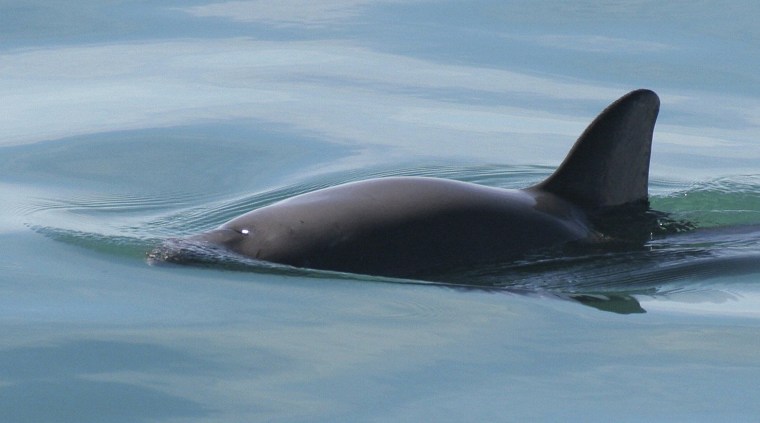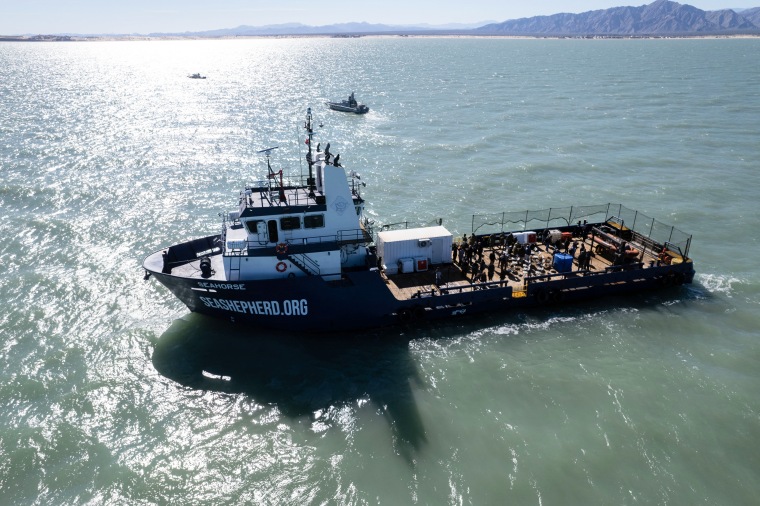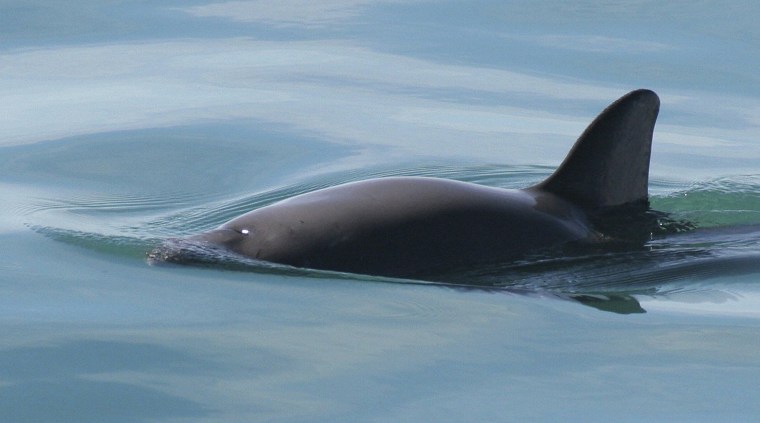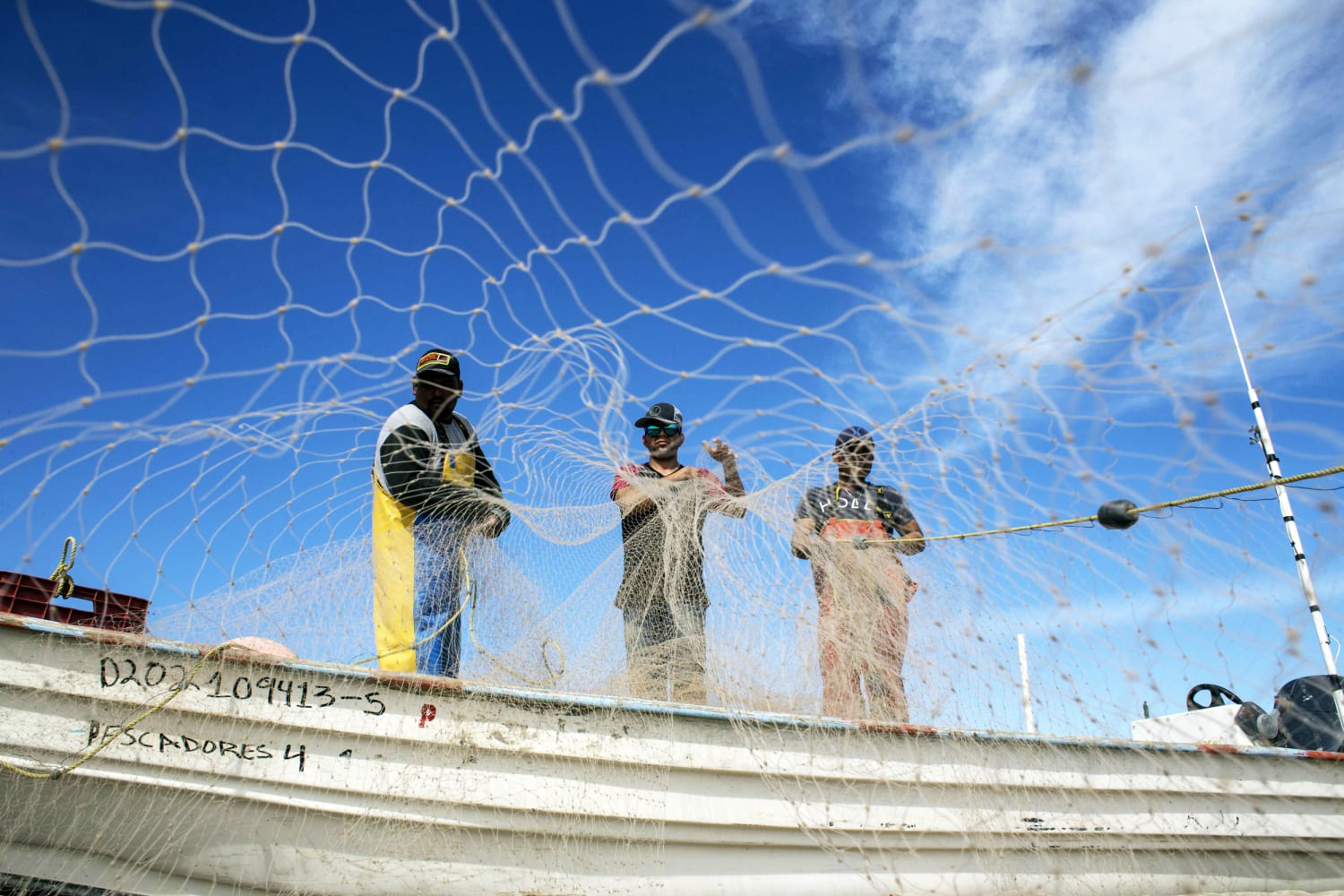On March 27, Mexico was sanctioned by the Convention on International Trade in Endangered Species of Wild Fauna and Flora (CITES), a global treaty that regulates wildlife, that found that the country’s “action plan is not adequate.”
In Chinese traditional medicine, the totoaba swim bladder is considered a source of health as well as of collagen, believed to slow down aging. It goes for thousands of dollars, and there’s high demand for this species, whose capture is prohibited in Mexico due to intense overfishing. This makes totoaba bladders one of the most valuable products on the black market of illegal wildlife trafficking, and it’s referred to as “the cocaine of the sea.”
Mexico has had little success in combating illegal totoaba trafficking. From 2016 to 2022, a total of 16 people have been convicted for this activity, according to data from the Office of the Federal Attorney General for Environmental Protection, obtained from 34 requests for information made by Telemundo News in collaboration with the Latin American Center for Investigative Journalism (CLIP).
“Mexico had to submit a compliance action plan and not just an action plan,” Ivonne Higuero, CITES secretary general, in an interview with Telemundo News.
“Those nets are wiping out many species,” Higuero said. “I have seen photos showing octopuses, turtles, shells and everything. That Sea of Cortez, which is a beauty, which is the world’s aquarium, we cannot spoil it. We have a biodiversity crisis right now.”
In addition, experts like Enríquez as well as CITES have pointed out an inconsistency in government figures regarding the seizure of illegally caught totoaba fish, which makes enforcement harder to track. For example, from 2016 to 2022, Enríquez’ group has studied 2,456 totoaba bladders seized by authorities, three times more than the government’s official figure for the seizures, which was 743 during that time, according to data provided by the government to Noticias Telemundo.
On April 13, the Mexican government announced that it had approved another plan to protect the totoaba and the vaquita, thus lifting the sanction that prohibited the country from selling any of the regulated wildlife species to the other 183 nations that signed the treaty.

The Center for Biological Diversity, along with two other environmental organizations, sued the U.S. Department of the Interior in December 2022 to trigger sanctions and an embargo on seafood imports from Mexico.
In response, the Interior Department announced on April 7 that it will determine whether Mexico has failed to comply with its obligations to protect the vaquita porpoise and totoaba.
If it determines Mexico has failed to comply with preservation programs, the Biden administration could embargo the importation of wild seafood products from Mexico, including shrimp and fish. An announcement is expected on June 3.
Many seizures, few convictions
According to official data cited by Traffic, a global environmental organization, from 2015 to 2019 alone, Hong Kong imported a total of 16,899 tons of fish bladders of different species, including totoaba.
Mexico’s low number of sentences and convictions contrasts with the huge seizures made by authorities in several countries, including Mexico: since 2013, from 26,000 to 30,000 totoaba bladders have been seized that have made the journey from Baja California to China and, in many cases, pass through the United States, according to a database developed by Enríquez at the Autonomous University of Baja California and research by environmental NGOs such as Earth League International and Traffic, among others.
In March 2022, Brookings Institution scholar Vanda Felbab-Brown published a report, “China-Linked Wildlife Poaching and Trafficking in Mexico,” in which she analyzed the problem and delved into the connections between species trafficking and organized crime groups.
“I think one of the most important conclusions of my report was that we found the presence of the narcos in the coastal areas, the Sinaloa Cartel and the Jalisco Cartel, and we found that they want to control each and every one of the fisheries, both legal and illegal, and all stages from processing to export,” Felbab-Brown said in an interview.
In 2018, the Earth League International published Operation Fake Gold, a 14-month investigation that tracked totoaba trafficking in Mexico. In that operation, the organization collected information on eight trafficking networks with a total of 1,420 people, all Chinese but with multiple local ties.
‘Mexico alone’ can’t control illegal trafficking
Mexico’s new plan to combat illegal totoaba fishing didn’t necessarily propose innovative solutions, according to activists and experts.
The Mexican proposal focuses on trying to prevent the entry of boats to the Zero Tolerance Zone, an area created in 2020 that is off limits to fishing; the government said the aim is to keep it free of gillnets.
“It’s very general — it doesn’t talk about any details, it’s not proposing anything new,” said Olivera from the Center for Biological Diversity. “The reality is that today people continue to fish with prohibited nets, mainly shrimp. It’s not just about the totoaba, right now it’s the curvina season and they’re also using gillnets. So everything stays on paper.”

The Mexican government also committed to monitoring the authorized loading and unloading boating sites, something which CITES has flagged: The international body said its inspectors spent an hour on the boardwalk in San Felipe, a fishing town in Baja California, and saw that “at least 15 boats went out to sea without authorization and without inspection.”
Three officials from Mexico who were at the CITES meeting in November but requested anonymity because they are not authorized to comment publicly said the pressure has been intense to get the gill netting and illegal fishing eradicated in the Sea of Cortez and other nearby areas.
Many argue that the 177,000 square kilometers (68,340 square miles) that make up the protected area are unreachable for a single government because of the enormous geopolitical complexity made up of criminal cartels, Chinese buyers, Mexican fishermen and the failures of protection systems.
“This is not an exclusive issue for us,” Blanca Alicia Mendoza Vera, head of the Federal Attorney for Environmental Protection, said in an interview with Noticias Telemundo. “Since there is demand from Asian countries, they must do what is necessary so that their laws cut off that demand. The same happens with transit countries, which are now also destinations, such as the United States. The claim is always against us, but Mexico alone cannot control totoaba trafficking.”
She stressed that international meetings demand that Mexico allocate significant economic resources to combat illegal fishing and conserve species such as the vaquita and the totoaba.
“We do not have a budget that is endless, and all this is done at the expense of our taxpayers. It is time to begin to recognize in the international arena that the protection of species is everyone’s responsibility, wherever we are, and, above all, help with the control of criminal activities,” Mendoza Vera said.
CITES’ Higuero agrees on the complexity of the methods and criminal networks that are dedicated to totoaba trafficking.
“This cannot be fought by a single country. Mexico has to make its efforts at the national level and apply the law, but in general this can only be fought at the international level and demand must be reduced,” she said. “We have programs to reduce demand, China also has them and they must enforce the laws because there are many ports, and the borders are porous between the countries of Asia. They are criminals that many times no one can catch and for that, international cooperation is needed.”
Seeing improvement
However, it is not all bad ecological news and geopolitical challenges in the Sea of Cortez.
Enríquez, the researcher at the Autonomous University of Baja California, developed a database to analyze the totoaba population and found some encouraging results.
“We have found that there is a lot of genetic variability in the totoaba population. It has been overexploited, and it continues to be caught illegally, as incidents in Mexico and other countries show, but fortunately there is various evidence that, at least, it is not found in critical danger of extinction,” he said.
Source: | This article originally belongs to Nbcnews.com










